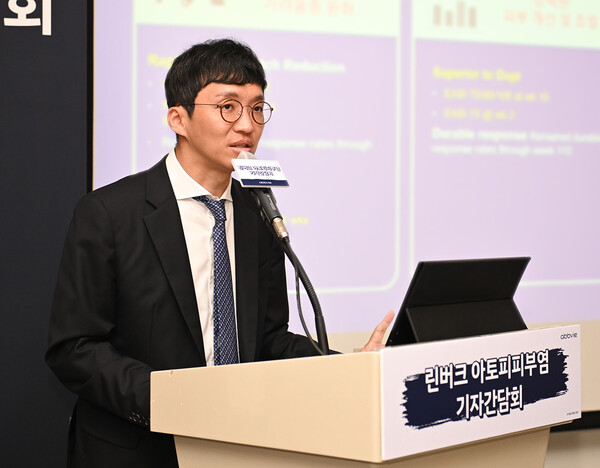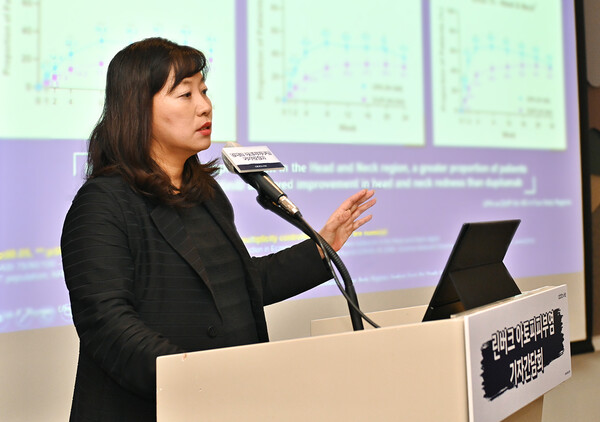AbbVie Korea is strengthening its position in the local adolescent atopic dermatitis market with Rinvoq (ingredient: upadacitinib), a treatment for moderate to severe atopic dermatitis armed with new reimbursement benefits, the company said Tuesday.
Rinvoq received expanded to include coverage for the treatment of severe atopic dermatitis in adolescent patients ages 12 and older from April 1.
During a press conference held in celebration of Rinvoq's expanded reimbursement, two local dermatology professors agreed that the reimbursement will serve as a new beacon of hope for adolescent patients suffering from severe atopic dermatitis.
The two professors stressed that there is growing interest in the Rinvoq, which is the only orally administered drug covered by insurance for adolescents.

"About 85 percent of adolescent patients with atopic dermatitis experience itching daily, 61 percent describe itching as severe or intolerable, 42 percent experience itching for more than 18 hours a day, and 77 percent experience moderate to severe pain or discomfort," Professor Jang Yong-hyun of the Department of Dermatology at Kyungpook National University College of Medicine said. "Also, sleep disturbance was found to increase with atopic dermatitis severity."
In addition, patients with moderate-to-severe atopic dermatitis were associated with significantly lower height percentiles and a higher risk of falling below the 25th percentile for height than those with milder disease, Jang added.
Professor Jang also said a study examining the association between atopic dermatitis and depressive symptoms at different points in childhood and adolescence found that severe atopic dermatitis was associated with depressive symptoms.
"As a result, it is important to treat atopic dermatitis from a young age as approximately 26 percent of patients with atopic dermatitis experience a rapid exacerbation during adolescence, and the risk of developing severe atopic dermatitis increases with age at onset of atopic dermatitis greater than 12 years, and peaks at age 30 years," he said. "The latest European Dermatology Forum guidelines for pediatrics and adolescents also recommend treatment with Rinvoq at the same level of recommendation as cyclosporine and biologics for severe patients on systemic therapy."
During the press conference, Professor Ko Joo-yeon of the Department of Dermatology at Hanyang University College of Medicine also presented the latest treatment guidelines and clinical data.

"A lower incidence of serious adverse events compared to traditional systemic treatments for atopic dermatitis, including corticosteroids, cyclosporine, and methotrexate," Ko said. "Also, through a cross-indication Safety study, which evaluated the long-term safety profile of Rinvoq across conditions including rheumatoid arthritis, psoriatic arthritis, ankylosing spondylitis, and atopic dermatitis, the drug was generally well tolerated, and no new safety risks were identified compared to previous studies."
According to Ko, the most common adverse event with Rinvoq was acne, with about half of the patients who experienced acne not requiring treatment and most of those who did require treatment as they were able to control symptoms with topical therapy.
"The occurrence of acne did not affect patients' quality of life or patient satisfaction with Rinvoq," she said.
Professor Ko also unveiled the data from 112 weeks of continuous treatment in the "Rising Up" study, which evaluated the long-term efficacy and safety of topical corticosteroids in combination with Rinvoq in Japanese adolescent and adult patients with moderate-to-severe atopic dermatitis.
"The results confirmed a similar safety profile to that seen in the 16-week study, with no new safety risks observed," she said. "In addition, the incidence of adverse events and serious adverse events in long-term treatment was lower in adolescents compared to the overall study population."
The latest clinical data show that Rinvoq is a fast-acting treatment for atopic dermatitis that provides a rapid improvement in sensitive areas such as the head and neck, genitals, and hands, which have a significant impact on patients' quality of life, Ko added.
Related articles
- Rinvoq proves efficacy, safety in adolescent atopic dermatitis
- ‘Allowing cross-administration needed to treat atopic dermatitis’
- Sanofi's Dupixent, AbbVie's Rinvoq to compete in Korea's pediatric atopic dermatitis market
- SCM Lifescience's stem cell atopic dermatitis drug shows benefit in phase 2 study
- AbbVie revitalizes Allergan's Botox with long-term safety data
- Korean pharma needs to shift focus from generics to new drug development: AbbVie Korea GM
- Pfizer's Cibinqo affordable at $77/month with reimbursement for severe atopic dermatitis
- AbbVie's Aquipta gets MFDS approval to prevent migraines in adults
- Rinvoq’s rapid pain relief sparks optimism for ankylosing spondylitis patients
- Dermatologists call for insurance coverage expansion for atopic dermatitis treatments

